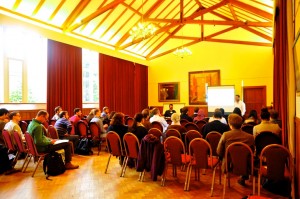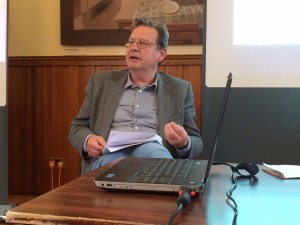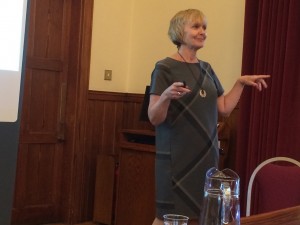The postgraduate “Conference on Rethinking Boundaries in the Study of Religion and Politics” was held 11-12 of September 2015 at the University of Aberdeen, in Aberdeen, Scotland. The conference was sponsored by the College of Arts and Social Sciences and Centre for Citizenship, Civil Society and Rule of Law, University of Aberdeen. Conference report for The Religious Studies Project by Ashlee Quosigk, a PhD student at Queen’s University Belfast, Northern Ireland.

The conference included keynote talks from both Timothy Fitzgerald and Abby Day; it also included over 30 postgraduate presentations, workshop sessions offered by Aberdeen staff, and lots of tea breaks that allowed for participants to get to know each other, all within the walls of the historic King’s College. The conference was multidisciplinary and provided a place for participants to engage in dialogue on how to think about boundaries in the study of religion and politics (e.g. religious/secular, private/public, belief/practice and theism/atheism).
The conference began with a keynote address from Timothy Fitzgerald, Reader in Religion, University of Stirling, entitled “Religion and Politics as Modern Fictions.” Fitzgerald argued that liberal journalists and academics, while attempting to provide factual reportage, tend unconsciously to reproduce ancient “us and them” narratives. Fitzgerald described a basic discourse among journalists that legitimates rational liberal modernity against all perceived forms of backwardness and irrational barbarity (e.g. Fitzgerald offered the example of western views of Islamic countries). In western discourse, he said, the assumption is that faith, unlike nonreligious secularity, has a propensity to irrational violence. Thus western discourse pits rational western civility against the other’s medieval barbarity and western secular logical reasonableness against the other’s inability to settle their differences through negotiation, free market relations, and respect for private property. He drew attention to what he called “myths of the modern,” with one example being the distinction between the religious and the nonreligious secular, and explained how these myths are perpetuated by a range of agencies, including the media, politicians, and academics, but also including constitutions and the courts. According to Fitzgerald, the problem with these “us and them” narratives is that “nations”, “geopolitics”, and “faith” are used in academic discourse and public rhetoric as if their meanings are self-evident and universal in their application, whereas Fitzgerald feels any claim to universal truth is problematic (for example, Fitzgerald holds that there is no true meaning of the term “God” outside someone’s or some community’s assertion that there is). Fitzgerald argued that the secular/religious binary also needs to be seen as an ideological position (rather than a self-evident truth), as the secular/religious binary is usually argued from a secular perspective (here he critiqued Edward Said, author of the famous Orientalism, on the basis that Said does not deconstruct secular reason and its dichotomous relation to religion and fails to see his secular/religious binary as an ideological position).

The postgraduate presentations were diverse. My presentation on “Intra-Evangelical Conflict on the Topic of Islam” fell within the session entitled “Conceptions of Islam” which also included a thoughtful presentation from the conference organizer Sarah Hynek on “Approaching the Categories of the Egyptian Muslim Brotherhood.” But the conference was certainly not entirely focused on Islam, and it also included sessions on a variety of topics such as “Approaching Atheism and New Atheism” and “Shaping Congregations.”
One of the most controversial postgraduate papers presented at the conference came from Armen Oganessian, who is pursuing a PhD in Divinity at Aberdeen. Oganessian proposed that if we were to view politics, or the public sphere, as a “marketplace of ideas,” that would allow us to move beyond the religious/secular binary that dominates western thought. In this “marketplace of ideas” framework, we should view all ideologies, concepts, or moralities as having a societal value, and politics as a kind of flea market for any given worldview to sell their perspective on how to govern the society. This framework frees religious thought of its unfair stereotype of only being suited for one’s private life, putting it on an even footing with all other worldviews. This would mean, for example, that the Buddhist would have the right, just like the socialist, to construct a foreign policy based on the beliefs and morals of his worldview and then have that policy be evaluated solely on its potential effects on the society (societal value) rather than on its religious underpinnings. Then any given individual, any given member of the said society, would be able to “purchase” either the Buddhist’s or the socialist’s–or parts of either’s—foreign policy. Then that foreign policy, or the parts of a foreign policy, most frequently purchased would be the ones adopted by the society, whether it be religious or not. Oganessian’s marketplace of ideas was highly criticized during the question and comment period. One critic argued that the “marketplace of ideas” would inherently favor capitalism. Some questioned the individual’s intellectual purchasing capabilities (e.g. people are too stupid to decide for themselves where to shop). Another critic argued that had Europe gone with the popular ideals of the Catholic Church, Europe would still be in the Dark Ages—a point with which Oganessian disagreed, noting that we cannot predict what would have happened with certainty and mentioning the possibility that perhaps we would be more advanced now.
Johan Rasanayagam hosted a workshop on “Approaching the Category of Islam.” Johan undergirded the workshop with readings from Talal Asad on The Idea of an Anthropology of Islam and Samuli Schielke on Second Thoughts About the Anthropology of Islam, or How to Makes Sense of Grand Schemes in Everyday Life. The workshop explored the issue of how to study Islamic communities without making Islam the object. Rasanayagam described his own personal research, which focuses on Muslims in Uzbekistan and what their moral understanding is of what it means to be a Muslim. He found that for some Uzbekistani Muslims, “being Muslim” might involve activities that one would typically think of as religious or Islamic –like going to the mosque, fasting, etc. But for many it also involves being a good neighbor, marrying their kids off properly, contributing to the community—basically, according to Rasanayagam, just being a good person. So the conclusion Rasanayagam came to at the end was that Islam, if it ever becomes an object at all, only becomes so within the moral self of one particular Muslim and that one Muslim’s “Islam” is different from every other Muslim’s “Islam.” According to Rasanayagam, when one tries to make Islam an object it automatically loses value and distorts reality. Thus, Rasanayagam ended up moving away from “Islam” and looking at the formation of moral selves, who just happen to be Muslim. Rasanayagam argued that rather than looking at the Muslim community or Islam, one should focus on the process by which something comes into being and continues.
Two other workshops were included: ‘Identity and Belief/Non-Belief” led by Marta Trzebiatowska and “Religion and Politics as Categories of the Modern State” led by Trevor Stack.

The conferences ended with a keynote address from Abby Day, Reader in Race, Faith and Culture, Goldsmiths University of London, on “Believing in the Future: The Religious and Non-religious Stories Young Adults Tell.” Day shared her findings from researching “Generation A” (grandmothers of Generation X) and the story of decline of mainstream Protestant Christianity mainly in the UK. Day contrasted these older women and the younger generation that they raised and how Generation A vs. Generation X differ on what they want from religion and what can be learned about religious change. Much of the conference content sympathized with the postmodern distrust of language and sought to deconstruct words/phrases such as “belong to a faith community,” “God,” and “Islam.” The conference left me with questions about how constructive deconstructing is and how far it may distance our research from the everyday reality of those we are researching. Can a distrust of language be solved with more language?
As with all multidisciplinary exchanges, it was refreshing and challenging for scholars to learn from the research of others in different fields.



